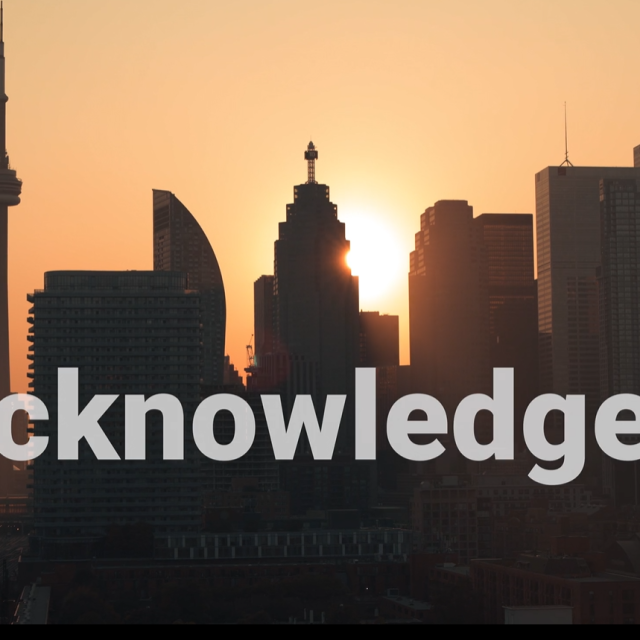
Watch the Beyond the Land Acknowledgement EDGE Event Webinar Here
In the EDGE Event, Beyond the Land Acknowledgement, guest speakers Billy Alexander, Director of Programs, Culinary Tourism Alliance, and Kevin Eshkawkogan, President & Chief Executive Officer of Indigenous Tourism Ontario, discussed the importance of a meaningful action plan that supports Indigenous People and Nations.
The findings of the 2015 Truth and Reconciliation Commission include a list of 94 calls to action urging all levels of government to work together to change policies and programs to repair the harm caused by residential schools. These actions signal the need to move forward towards reconciliation and outline the opportunity for reflection and a path to build new relationships that contribute to our collective well-being. Since then, a growing awareness of systemic Indigenous oppression has led to an increased use of land acknowledgements as a means to demonstrate a person or organization’s intention to support, or stand with, Indigenous Peoples and causes.
Land acknowledgements are now a staple at public events in Canada, but without thoughtful intent, they can become automated or can come across as a form of virtue signaling. Change will only come when non-indigenous people lean in, and acknowledge and engage in the work that still needs to be done to walk the path to reconciliation.
“You have to expect to make mistakes. And it’s okay to make mistakes, because non-natives in this country have not been properly educated through the education system…Do the work, try to get educated. If you want to bounce things off of us, whoever is in your network, great, but it’s okay to make a mistake.”- Kevin Eshkawkogan, Founder and CEO of Indigenous Tourism Ontario
“I’ve seen that evolution…where they ask for us to write it because they are scared and afraid, but now it’s changing. I get fewer and fewer of those requests, which is nice, because they are putting in the work.”- Billy Alexander, Director of Programs, Culinary Tourism Alliance
A land acknowledgement is a good thing, but if the words have no action to back them up, or they are performed with no intent or even worse as a check box, they start to lose their impact.
The discussion with Billy and Kevin centered around how to create a land acknowledgement that respectfully recognizes the traditional Territories and Treaties and honours the Indigenous Peoples who have lived on Turtle Island for centuries, examining why they matter today and the importance of creating meaningful action that goes beyond the land acknowledgement. Acknowledgements should be a celebration of Indigenous People and their contributions to our society, not only in the past, but today and into the future. It is an act of empowerment.
Links to videos shared during the EDGE event
This Land Acknowledgement was commissioned by Destination Toronto. The text and video was a collaboration between writers/spoken word artists Jennifer Alicia Murrin (Mi'kmaw/Settler) and Luke Reese, director/dramaturg Keith Barker (Metis), director Michael Hidetoshi Mori and Destination Toronto. It was created in consultation with Keith Barker, Artistic Director of Toronto’s Native Earth and numerous indigenous musical artists, whose guidance was that acknowledgements should be as led by settler voices as by indigenous voices, as there is a greater gap in understanding and recognition in settler populations and therefore a greater need for leadership to also come from within settler populations when acknowledging indigenous histories and nations.
The process was rooted in a desire to acknowledge the long history of the land now known as Toronto and a challenge to do so in a way that would provoke more than just a nod. The Land Acknowledgement was created for Destination Toronto, and engaged Toronto's vibrant performing arts scene who embody the stories of this land. The challenge was to create a call to action that would also serve as an acknowledgement honouring the Nations who have and still call Tkaronto home.
2. CBC’s Baroness Von Sketch Stolen Land Skit
Learn more about ways to create a meaningful land acknowledgement and steps to go further in your action plan here.
The Indigenous Tourism Ontario Land Acknowledgement Resource Guide can be found here.
The information found here is intended to help you find the right way to begin your work reflecting on how you can meaningfully express your own personal relationship to Indigenous communities and the land. The conversation around Truth and Reconciliation is part of the evolution, as are the resources and recommendations shared. It's important to remember that ongoing research, outreach and engagement beyond what is found here is necessary to deepen the impact.
“A Land Acknowledgement should be an organic thing…we’ll look at things that are right, right now, but are continually changing based on our history and our learning. They should be evolving.”- Billy Alexander, Director of Programs, Culinary Tourism Alliance
Additional Resources
For more information on the speakers' organizations, please see below:
About Indigenous Tourism Ontario
Indigenous Tourism Ontario (ITO) is the province’s first and only dedicated Indigenous tourism organization that focuses on uniting communities, Indigenous organizations and industry leaders to support the growth of Indigenous tourism in Ontario. Through product development and marketing of authentic Indigenous experiences, ITO establishes a platform for Indigenous cultural expression and preservation through tourism. For more information, visit indigenoustourismontario.ca.
About Culinary Tourism Alliance
The Culinary Tourism Alliance is a not-for-profit industry organization. Towards bridging the gap between the food & drink and tourism industries, we represent a strong membership base in Ontario, celebrate restaurants committed to sourcing Ontario food & drink through our Feast On® program, and work internationally with destinations of all shapes and sizes to grow food tourism. Our vision is for culinary tourism to be a meaningful and sustainable contributor to local economies in destinations worldwide. For more information, visit culinarytourismalliance.com.

